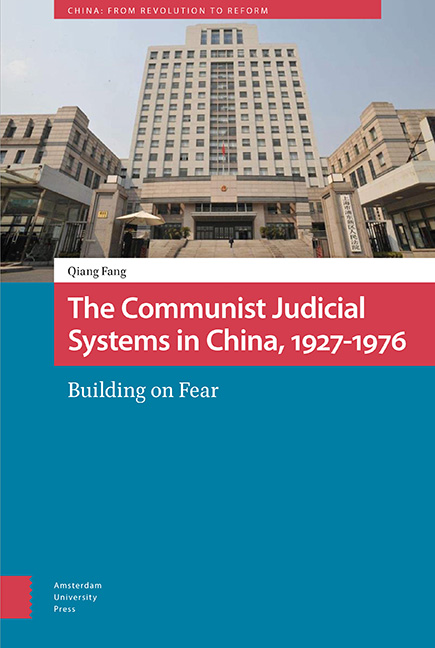Book contents
- Frontmatter
- Contents
- List of Tables
- Dedication
- Acknowledgement
- Acronyms
- Introduction: Building on Fear
- 1 Born in Blood: Origin of the Communist Judicial System in China, 1927–1935
- 2 Cornerstone or Aberration?: The Communist Judicial System during Wars with Japan and the GMD, 1936–1949
- 3 From “Excessive Lenience” to Harshness: The Communist Judicial System in the Early PRC, 1949-1952
- 4 A Deliberate Purge: Legal Reform in the Early PRC, 1952-1953
- 5 A Golden Age?: The Communist Judicial System in China, 1953-May 1957
- 6 The Great Leap of Law: The Communist Judicial System in China, 1957-1965
- 7 Not the Worst Period of Law: The Communist Judicial System in the Cultural Revolution, 1966-1976
- Conclusion: From Party’s Fear to People’s Fear
- Bibliography
- Index
7 - Not the Worst Period of Law: The Communist Judicial System in the Cultural Revolution, 1966-1976
Published online by Cambridge University Press: 18 June 2021
- Frontmatter
- Contents
- List of Tables
- Dedication
- Acknowledgement
- Acronyms
- Introduction: Building on Fear
- 1 Born in Blood: Origin of the Communist Judicial System in China, 1927–1935
- 2 Cornerstone or Aberration?: The Communist Judicial System during Wars with Japan and the GMD, 1936–1949
- 3 From “Excessive Lenience” to Harshness: The Communist Judicial System in the Early PRC, 1949-1952
- 4 A Deliberate Purge: Legal Reform in the Early PRC, 1952-1953
- 5 A Golden Age?: The Communist Judicial System in China, 1953-May 1957
- 6 The Great Leap of Law: The Communist Judicial System in China, 1957-1965
- 7 Not the Worst Period of Law: The Communist Judicial System in the Cultural Revolution, 1966-1976
- Conclusion: From Party’s Fear to People’s Fear
- Bibliography
- Index
Summary
Abstract
This chapter focuses on the role of the judicial system in the Cultural Revolution, an era that is often reduced to political turmoil, lawlessness, Red Guard brutality, and mass killings. Little ink has been spilled on describing the day-to-day function and practice of the judicial system in this significant period. In the first two years, the Communist judicial system was clouded by inaction and revolutionary chaos as judicial cadres were involved in factional fights but stayed mostly free of street violence. Starting from early 1968, the military took over the judicial system. Unlike local gazetteers that tend to emphasize the harsh punishments of military-controlled courts, local archives offer a more moderate picture of courts that is consistent with the early years of the PRC. As had happened several times in the past, the judicial rehabilitation began as early as 1970 and it lasted until the spring of 1976. While judicial and official violations of the law were excessive, they were not as egregious as in some other periods of Mao's China.
Keywords: Cultural Revolution, six regulations of public security, military control committee of the police department, restoration of the People’s Court, not the worst period
In 1966, Mao initiated his last revolution, the Cultural Revolution, ostensibly to counter the growing threat of capitalism since the 7000-people meeting in 1962 and also, as Elizabeth Perry remarks, “to cultivate ‘revolutionary successors’ by giving young people a taste of the hardship” of the aging revolutionary generation. The movement lasted until Mao's death in 1976, leaving untold death and trauma behind. For decades, scholars around the world have spilled much ink on the Cultural Revolution. From Yan Jiaqi’s Ten-Year History of the Chinese Cultural Revolution to more recent studies authored or edited by Roderick MacFarquhar and Michael Schoenhals, Andrew G. Walder, Joseph Esherick, and Paul Clark, we have learned a lot about the movement. Other scholars have concentrated on more specific aspects of the Cultural Revolution. For example, in The Cultural Revolution at the Margins, Yiching Wu centers the “voices and historical visibility” of people at the peripheries of the movement.
- Type
- Chapter
- Information
- The Communist Judicial System in China, 1927–1976Building on Fear, pp. 255 - 292Publisher: Amsterdam University PressPrint publication year: 2021



